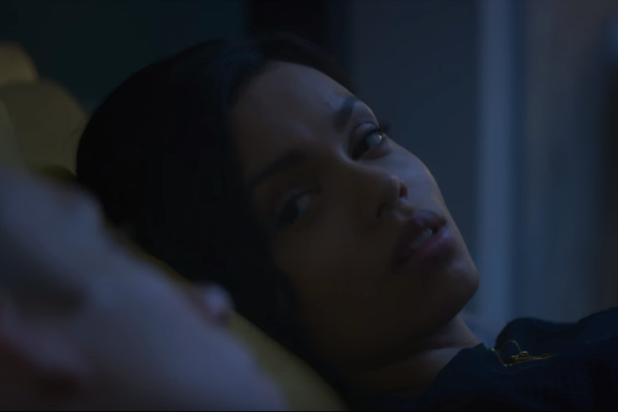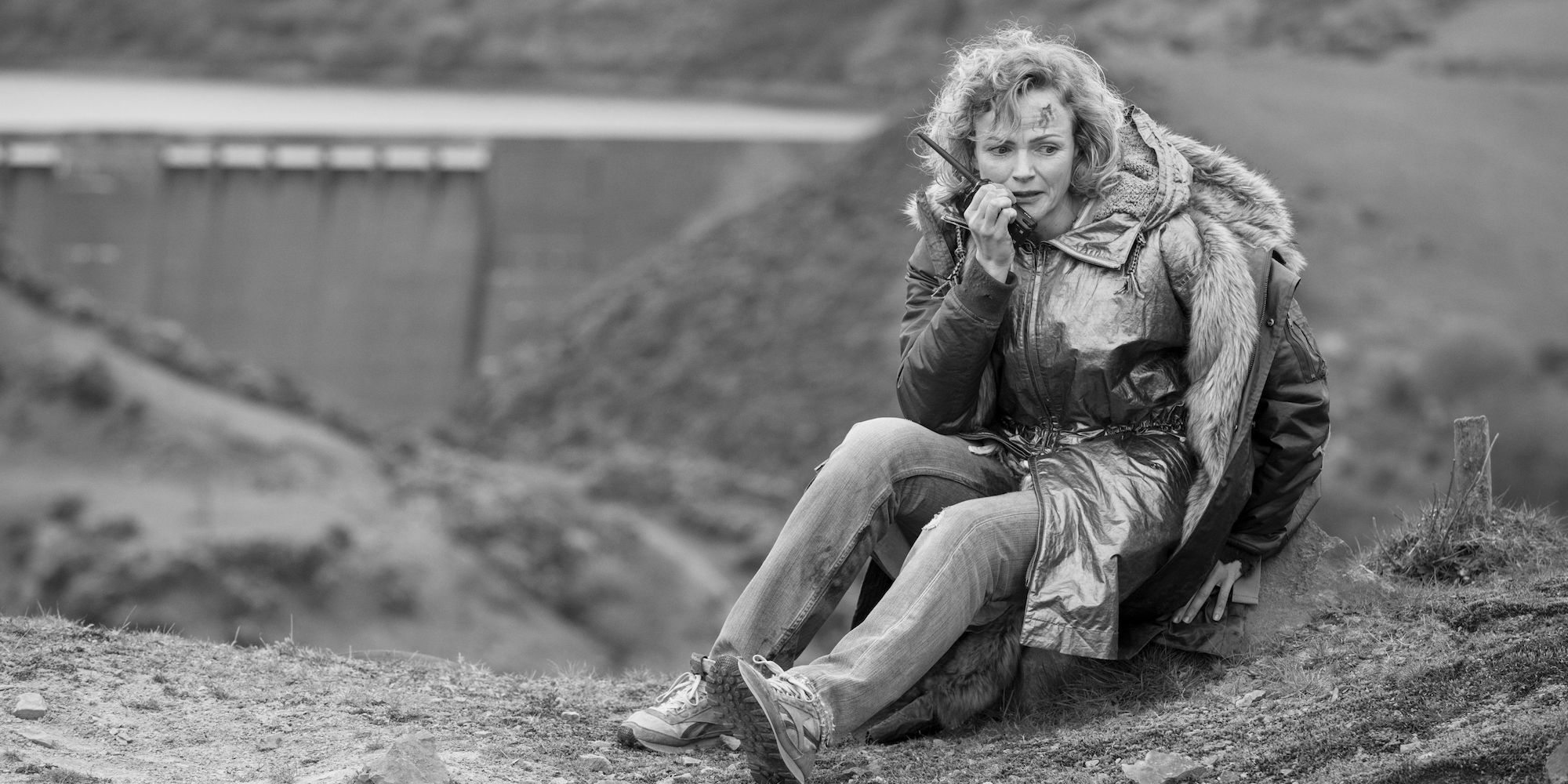Black Mirror has become a show whose reputation now precedes it. It's almost more recognisable as a shorthand for an example of technology or politics gone insane than it is as an actual television show. Meanwhile, the wider pop cultural conversation around the show since its first Netflix season dropped last October has been overwhelmingly focused upon one episode - the Emmy-winning San Junipero. You'd be forgiven for forgetting that five other episodes came out last year.
Here we are, then, with six new slices of dystopia from the mind of Charlie Brooker to round out a year that's felt like an unsubtly written episode that's long since outstayed its welcome. Season four is, by quite some distance, the most varied season of Black Mirror yet. There are plenty of horrific twists and examples of haywire technology, but the latest season feels like a conscious rebuke to that public stereotype of the show as a misanthropic depression-fest. Here, then, are spoiler-free reviews of each episode of the new season:
USS Callister
Starting the season with USS Callister seemed an odd move on Charlie Brooker's part. Of the six episodes of season four, Callister stuck out as the black sheep, adopting a drastically different approach and aesthetic than the typical fifteen-minutes-into-the-future feel of classic Black Mirror. However, it soon becomes abundantly clear exactly why it got the premiere slot - it's this season at its most exciting and varied.
It is of a piece with the other five episodes of the season in how it takes a piece of technology and depicts the way in which it teases out the ugliness of humanity, but Callister's strengths derive from rejecting the typical feel and structure of a Black Mirror episode for a great deal of the run-time. The stakes are high, but the tone is surprisingly light, befitting the propulsive feel of the caper that takes up a significant portion of the episode's generous 76-minute run-time.
Moreover, it's a rare ensemble piece that puts a team dynamic at the forefront instead of focusing upon one or two anguished individuals like the remainder of the fourth season. That allows for a handful of really great performances from a recognisable cast of character actors, such as Breaking Bad's Jesse Plemons as a very Black Mirror take on Star Trek's Kirk or Jimmi Simpson's emotionally layered tech bro type. The strongest performance of the lot, however, is delivered by Cristin Milioti, whose character quickly proves to be both the episode's emotional heart and its chief source of humour.
There are a few contrivances and leaps of logic required to keep Callister's manic momentum going, and the episode's science-fiction narrative can seem to operate on a maxim of 'just go with it'. Fortunately, Callister is both entertaining and genuinely thoughtful enough to justify the lack of watertight plotting. It's not the masterpiece that San Junipero was, but in its willingness to break out of the usual Black Mirror formula while maintaining the show's spirit of weary, cynical humanism, it feels like season four's counterpart to last year's incredible achievement. For my money, it's the best of the season. A
Arkangel
If Callister is season four's equivalent of San Junipero, then Arkangel can be compared easily to season three's premiere episode, Nosedive. The two episodes are very different in tone and focus, but they both function as each season's user-friendly encapsulation of classic Black Mirror themes. As a result, Arkangel shares Nosedive's flaws, such as a narrative simplicity that engenders a certain predictableness and ensures that the episode can never quite answer the complex philosophical questions that it poses. It also means that Arkangel feels like season four at its most reliably solid - and given the sheer range of quality and genre on display in this new collection of stories, an episode that treads on firm, if familiar, ground, is a welcome addition to the mix.
The story is a simple mother-daughter parable that uses technology to explore the uneasy relationship between protective and liberating instincts that parents can feel, and its minimalist approach, with a small cast and lack of background world-building, ensures that the story plays out in an emotionally focused and nuanced manner. Season four is chock-full of excellent performances by female leads, and Rosemarie deWitt's turn as a concerned mother here is a prime example of that, bringing empathy and pathos to a character whose decisions could have seemed irrational and ridiculous in less capable hands.
Arkangel is by no means a revolutionary instalment, but it's a strong mid-tier effort with some impressive direction by season four's most notable crew member, director Jodie Foster. B+
Crocodile
Here's where season four gets complicated. Crocodile pitches itself as another meat-and-potatoes episode of Black Mirror in the first ten minutes, and in a certain sense, it never really leaves that trajectory. On the other hand, this feels far more of an anomaly than it perhaps intends to be, as the episode's solid start soon gives way to a form of narrative boundary-pushing that doesn't really work effectively.
It's a gripping first act and a half, at least. Andrea Riseborough, an underrated actress, is excellent as a successful businesswoman caught up in a horrific incident before the episode's title card hits, and her panicked performance hammers the emotional urgency of the events unfolding home. Likewise, Crocodile's ambition to emulate moody, small-scale Nordic crime dramas initially hits the mark, with a carefully unravelling crime story brought to life with beautiful, snowy Icelandic vistas in the background.
But, in its last half, Crocodile goes too dark, throwing out a series of mind-numbing twists that register less and less as the episode flicks through them. The promising conceit of 'memory extraction' and exploring the subjectivity of our memories is woefully underutilised and replaced by a less intriguing philosophical question. It's the darkest that season four gets, and, to be honest, it's too much. Classic Black Mirror's misanthropy at least served a purpose of opening up moral questions and forcing us to consider our empathy for certain characters. The nihilistic bleakness of Crocodile, on the other hand, eventually comes across as emptily manipulative.
Crocodile is an episode that I suspect many fans of the bleaker version of this show will love, but, in a season where the best episodes offer up a modicum of hope and optimism, its coldness left a bad taste in the mouth as the credits rolled. B-
Hang the DJ
It's very easy to imagine Hang the DJ functioning as season four's most divisive episode. Especially after the familiarity of Arkangel and Crocodile, the sudden pivot into romantic comedy might feel jarring and unwelcome for some. For me, it's a jolt of energy that comes at exactly the right time in the season.

Hang the DJ pivots around what creator Charlie Brooker termed 'futuristic Tinder', in an alt-world where relationships are given an expiry date that binds the participants together for periods ranging from 12 hours to several years. Within that mildly disturbing framework, a story of tentative, frustrated love plays out between Frank, played by Joe Cole, and Amy, played by Georgina Campbell, which is where I ought to stop describing the plot.
Unusually for Black Mirror, it's an episode that brings to mind shows like Master of None and Lovesick in its exceptionally contemporary study of the search for 'the one' against opposition from both personal circumstances and societal structures. There's some light philosophising about free will and herd mentality, but it's, for the most part, a lighthearted and humorous love story delivered with wit and emotional intelligence. Campbell and Cole are charming and funny, and even as the people around them feel thin and unrealistic in their characterisation, the story's leads remain endlessly engaging to follow and root for.
Hang the DJ falls a little behind USS Callister, due its confinement to modern rom-com tropes in certain areas, and it shares Callister's habit for clunky foreshadowing and contrivances, but it stands head and shoulders above most other episodes this season through its refreshingly different and somewhat optimistic central tale. A-
Metalhead
If you're looking for formal experimentalism in your Black Mirror, look no further than Metalhead, a 40-minute near-silent single-hander horror movie filmed in black and white. Its aims to bust open the Black Mirror formula are obvious from the very first frame, and they're admirable. This season can often get bogged down in exposition and world-building as they describe their technological conceits in depth, so the bare-bones plotting of Metalhead, and its woman vs. metallic dog chase, is a breath of fresh air in certain respects.
At its best, Metalhead is a genuine thrill, carving out an elemental story of survival dramatised brilliantly by Maxine Peake, who holds the episode on her shoulders throughout. If it sounds like a back-handed compliment to say that I'm glad the episode exists, then therein lies the problem - for all the excitement that Metalhead generates, its minimalistic approach ultimately ends up working against it. There is virtually nothing to latch onto or care about in the story, and when the final act demands emotional investment, it falls flat. There's a good reason why there are so few episodes like Metalhead - they're almost impossible to do well.
Metalhead's boldness is welcome, but it shoots for a goal that it doesn't have the deftness to accomplish, eventually overstaying its welcome in spite of its extremely short runtime. B
Black Museum
Finally, there's Black Museum. By announcing itself as an anthology, the season finale put itself in the difficult position of inevitable comparisons to White Christmas, which delivered a terrific set of interlocking stories that coalesced satisfyingly at the end. Combined with the promises of shared-universe world-building that would link past episodes together, and this was one of my most anticipated of the season.
Frustratingly, it falls well short of those expectations. Black Museum is season four's biggest disappointment, and it ends the season on a flat note after the early promise exhibited in the first two episodes. It's not unentertaining, as the three stories of technological horror it depicts all stem from interesting premises that inevitably come to link together, but its variety-show presentation, personified by museum keeper Rolo Haynes, belies the episode's hollowness. It's about a lot of things, in a certain sense, given how much story it packs in, but it's not really about anything. The stories presented don't explore any particularly interesting themes, and function as surface-level light shows of horror and pain. And when the time comes for Black Museum to make its final point and link everything together, its conclusion utterly fails to justify all the pontificating that came before.
Black Museum isn't terrible, but it's an indulgement of some of Black Mirror's worst instincts that fails to remember the things that really made the show popular in the first place. Not even spirited performances by Letitia Wright and Douglas Hodges can save what amounts as a depthless trudge. C+
Final Thoughts
Season four is Black Mirror's most mixed season yet. USS Callister and Hang the DJ prove that the show is still capable of breaking new ground, and Arkangel is a solid slice of character-driven techno-horror, but its bleak instincts for big final twists and moments of nihilism feel more hollow than they used to, and fail to register emotionally. It's a worthy season, but one that can only be recommended with caution.
Overall Grade: B




